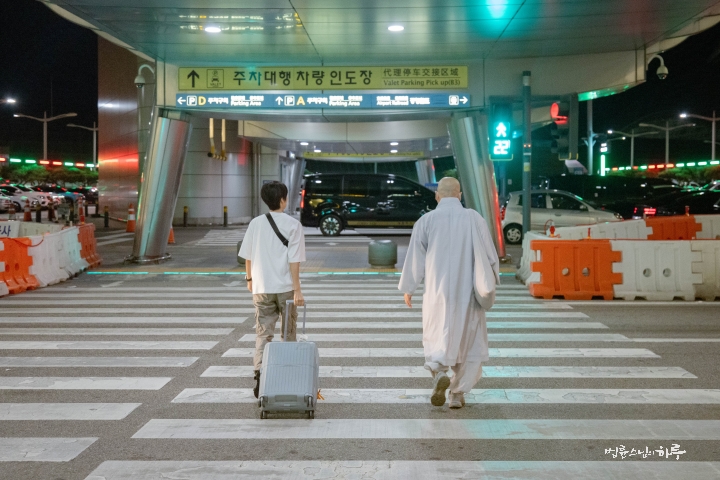Sep 23-24, 2024 – Arrival in Korea
Hello. Today is the day Sunim arrives in Korea after a month-long overseas schedule.

The plane that departed from Los Angeles Airport at 11 PM the day before yesterday arrived at Incheon Airport at 4:20 AM Korean time today after a 12-hour and 20-minute flight. Due to the 16-hour time difference between the United States and Korea, a day passed during the journey. Sunim spent the entire night in the sky.
After completing immigration procedures and exiting Incheon Airport, Sunim headed directly to the Seoul Jungto Center.
Arriving at the Jungto Center at 5 AM, Sunim unpacked and held a meeting with JTS President Park Ji-na at 6 AM. First, Sunim received a report on President Park’s survey of Bangladesh. There are about 1 million refugees living in the Rohingya refugee camps in Bangladesh, but international fundraising has decreased significantly since the Ukraine war, leading to a reduction in the distribution of essential goods. As a result, UNHCR requested JTS to provide soap and laundry soap. A few days ago, President Park and JTS volunteers went to Bangladesh to conduct market research and price negotiations to provide 5 million bars of soap and returned last night. Sunim received the survey report from President Park and discussed support plans. After the meeting, President Park immediately left for the airport to inspect the construction of schools in the earthquake-affected areas of Türkiye and Syria.
After organizing belongings and having lunch, Sunim held a practical preparation meeting with the Dharma teachers in charge of the India pilgrimage at 1 PM. The meeting concluded after reviewing the overall preparation status, including the number of participants, vehicle assignments, and detailed schedules.
From 2:30 PM, Sunim met with staff members to discuss the transfer of duties due to the chief secretary’s sick leave request and to coordinate the second-half schedule. They decided to divide tasks such as schedule management, approval communication, guest reception, and driving among existing volunteers. After the subsequent meetings, Sunim rested in the afternoon to recover from travel fatigue. Having been unable to rest sufficiently while traveling to over 10 countries for lectures and support activities over the past month, Sunim finally had time to catch a breath.
As there was no Dharma Q&A today, this article will conclude by sharing a conversation between Sunim and a questioner from the Dharma Q&A held in Orange County the day before yesterday.
I React Sensitively to Others’ Gazes and Evaluations
“First, we need to establish the right perspective on what evaluation is. It’s important to have the perspective that evaluation is done to find whether a person is suitable for a job or not, rather than distinguishing superiority and inferiority between people. With this perspective, a person doesn’t become inferior just because they’re not suitable for a job. Also, a person who is evaluated as suitable for a job isn’t necessarily superior. They’re simply suitable for that job.
But what happens if we evaluate people based on superiority and inferiority? Those who receive a superior evaluation develop a superiority complex. Those who receive the opposite evaluation develop an inferiority complex. However, this isn’t the reality of that person. When others evaluate me, they do so based on their own standards. It’s the same as when I evaluate them based on my standards.”

“In my profession, I often have to evaluate and point out things to others. Should I approach this by thinking, ‘This is just my opinion,’ every time I do so?”
“You must have your own evaluation criteria, though I’m not sure what they are. I would like to suggest that instead of using superiority or inferiority as your evaluation standard, use suitability for a particular task as your criterion. Let me use myself as an example. I’m often evaluated as being somewhat cold towards people. This makes me suitable to be a monk. However, it would make me unsuitable as a husband in a marriage. You might think, ‘Sunim is so great. I wish I could live with him even for a day.’ But if you were to spend just three days with me, you’d conclude, ‘Oh my, my husband is a hundred times better.’ (Laughter)
When evaluating, we shouldn’t discuss superiority or inferiority. Evaluation isn’t about what’s good or bad, but about what’s suitable or unsuitable for a given situation. Out of the millions of talents humans possess, it’s not right to rank children based on just three subjects: math, English, and Korean. We can say ‘This child is good at math’ or ‘That child is good at English,’ but it’s problematic to say ‘This child is exceptionally talented.’ Moreover, the evaluation criteria themselves are problematic. Tests can evaluate memorization skills, but it’s difficult to assess creativity. These days, creativity is valued more highly. Sometimes, people who seem a bit odd from a conventional perspective create something new and gain recognition for their talent. Schematic thinking is no longer sufficient for demonstrating creativity. In the future, artificial intelligence will likely replace all tasks that can be systematized. Perhaps only unpredictable areas will remain for humans to work in. Therefore, when evaluating, we should consider time, space, and whether a person is temporarily suitable for a particular task. This shouldn’t become an evaluation of the person themselves. The questioner should evaluate in this way, and also interpret others’ evaluations of themselves from this perspective.
Evaluation is not objective. No matter how hard we try to establish objective criteria, people inevitably evaluate based on their own standards. Therefore, you shouldn’t worry too much about how others evaluate you. It’s impossible to receive positive evaluations from everyone. Even for me, while you give me such positive evaluations, there are others who call me a ‘commie’ for providing humanitarian aid to North Korea and tell me to ‘Go live in North Korea instead.’ When I said it’s better for mothers to raise their children until they’re three years old, working mothers in their 30s criticized me, saying, ‘Why don’t you try having and raising a child yourself?’ It’s impossible to receive positive evaluations from everyone. I hope you understand that this is the nature of evaluation.”
“Yes, I understand. Thank you.”

Tomorrow, Sunim will attend a meeting of religious leaders for national reconciliation and peace in the morning, followed by a live broadcast of the daytime Weekly Dharma Assembly. In the afternoon, he will participate in a peace research seminar and attend a planning committee meeting. In the evening, he will conduct a live broadcast of the evening Weekly Dharma Assembly.”




